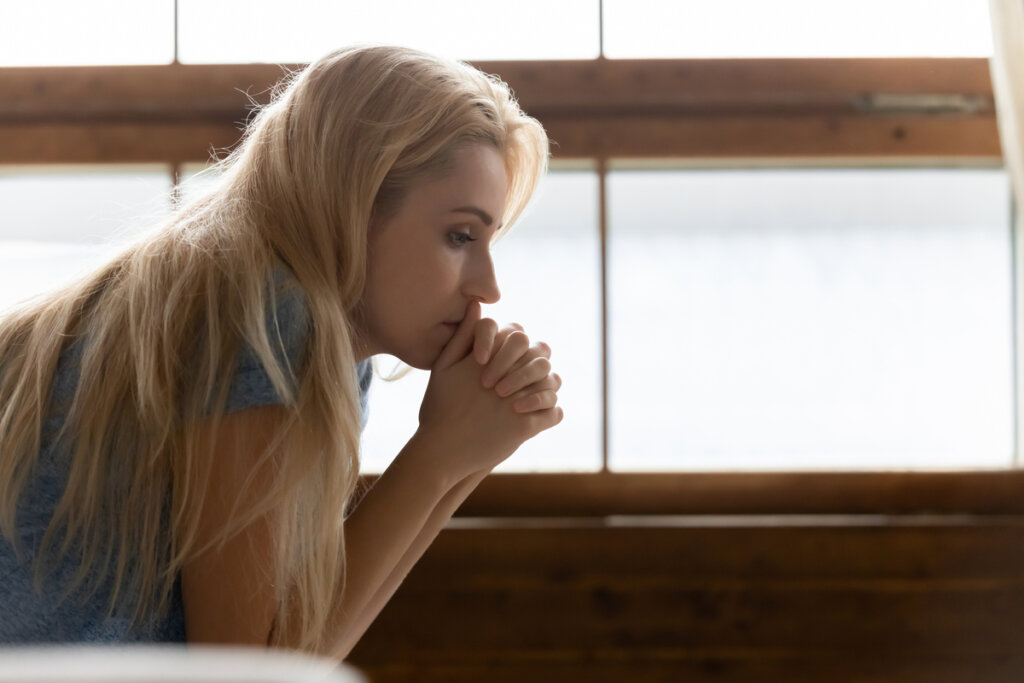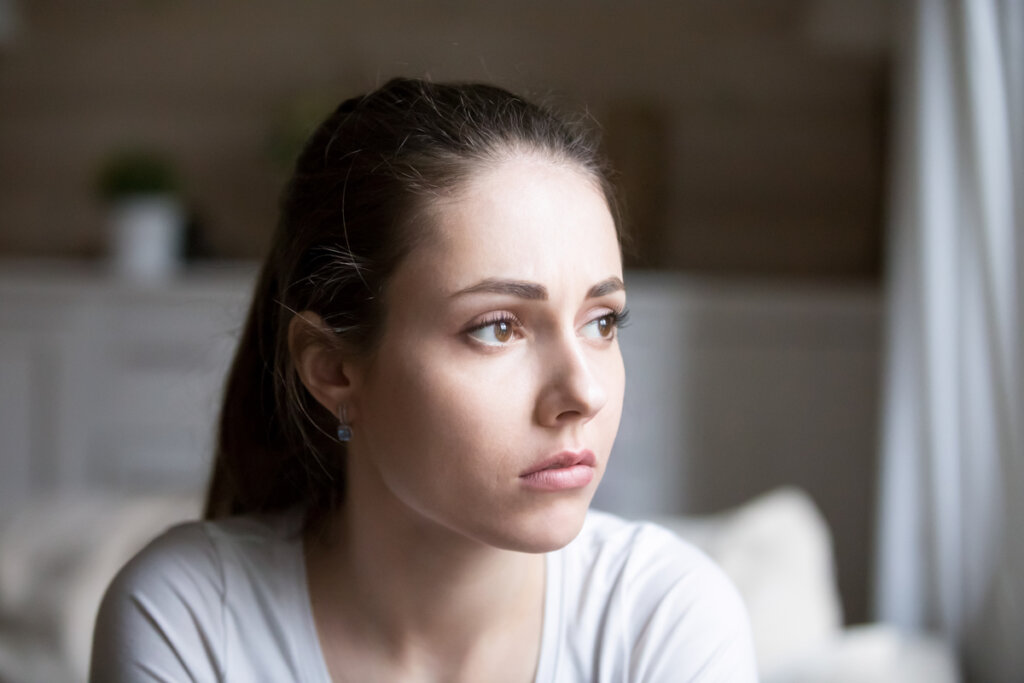You Don't Want to Have Children But Are Scared You Might Regret It


Written and verified by the psychologist Sara González Juárez
The decision of whether to have children or not can be a difficult one for many people. Many gravitate toward the idea of not having them but are also afraid of the possibility of feeling like they’ll want them later when it’ll be too late.
This insecurity stems from certain issues that don’t tend to be spoken about. Why would someone choose not to have children? Is it a natural rejection of motherhood or are there unrelated external factors? Do social circles have an influence when it comes to fearing future regret?
The expectation of regret as opposed to the satisfaction of desire is a relevant issue for anyone looking to the future. That’s what we’ll address in this article.

Why would you not want to have children?
Years ago, the socioeconomic and family configuration of the Western world established that having children was a natural part of the life cycle. However, the most recent generations have questioned this, highlighting some of the advantages enjoyed by those who’ve chosen not to procreate. That said, as always happens when freedom expands in any field, doubts have also surfaced.
Testimonies that express the fear of bringing someone into a destroyed world, transmitting hereditary diseases, or even being unable to support a child in the future are common.
In most cases, if only for the fact of going against the tide, the decision not to have children is always considered in depth. If you’re in this kind of situation, some of these reasons may sound familiar to you:
- The state of your finances won’t allow it.
- You’re afraid that you won’t be a good parent.
- The pace of life you lead isn’t compatible with motherhood.
- You’re being socially pressured to have children.
- The socioeconomic future of the region where you live is uncertain or ominous.
- You have certain political ideas, such as the opinion that the human species shouldn’t expand any further.
Why fear future remorse?
Looking at the reasons above from a logical point of view, you’re totally within your rights to not want children without feeling any remorse. However, it’s perfectly natural to experience concerns over possible later regrets. These might have several origins. Some of them are:
- Sexist fallacies. Two myths that are opposed and that, at the same time, coexist, are the fallacy that women have an innate tendency to want to be a mother yet they also have total freedom of choice when deciding the issue.
- Social pressure. You might feel pressure from your social circle when you tell them you don’t want to have children. When they’re faced with the decision that you’ve maintained over time, you might find yourself being asked “What if you later regret it and you’ve missed your chance?”
- The idealization of motherhood. The system and, therefore, society, are geared toward population growth. Therefore, the enormous responsibility of having a child is often presented as ‘the best thing that can happen to a woman in her life’. This sows the seeds of doubt, making you believe that you could be missing out on something amazing forever.
Are you sure you don’t want children but are afraid you might regret your decision later?
If you’re in this situation, you may want to get rid of your fears, because you recognize them as alien to you. We recommend an exercise of introspection and reflection.
The decision to have or not to have children is yours
The aspirations you draw on your horizon and the means you decide to use to achieve them belong to you. Perhaps, your fear of future regret is being fueled by the kind of social pressure that suggests you should have children.
Your fear doesn’t only come from you
The fear of not having children and feeling regret afterward doesn’t only come from your uncertainty about the future itself but from many other factors. Therefore, if you want the simplest answer possible, ask yourself what you want and not others.

Some people regret having children
Although expressing it (and possibly even thinking about it) is a deeply rooted social taboo, there are also people who decide on motherhood and later regret it, since it’s a path with no turning back. Therefore, rather than asking yourself if you’d regret not having children, ask yourself if you’d later regret having them.
Value your self-knowledge
If you feel confident about your choice in this matter, it’s for a reason. If you don’t feel like taking care of someone, if you think they’re going to be born into a world that’s going to mistreat them, or if you simply don’t want to form a normative family, that’s perfectly fine. You won’t necessarily change your mind in the future.
What if you regret your decision?
Of course, there’s always a chance you may feel regret in years to come. This is where emotional responsibility for yourself comes in. It’s not linked to securing something in the future, because that can’t be controlled.
It consists of making decisions based on your own criteria that are free, as far as possible, from outside influence. Therefore, if you were to regret your decision in the future, you’d at least know that it was yours and yours alone to make.
Finally, don’t ever be afraid to speak out against the general consensus. After all, it’s your life and any regrets will also be yours alone.
The decision of whether to have children or not can be a difficult one for many people. Many gravitate toward the idea of not having them but are also afraid of the possibility of feeling like they’ll want them later when it’ll be too late.
This insecurity stems from certain issues that don’t tend to be spoken about. Why would someone choose not to have children? Is it a natural rejection of motherhood or are there unrelated external factors? Do social circles have an influence when it comes to fearing future regret?
The expectation of regret as opposed to the satisfaction of desire is a relevant issue for anyone looking to the future. That’s what we’ll address in this article.

Why would you not want to have children?
Years ago, the socioeconomic and family configuration of the Western world established that having children was a natural part of the life cycle. However, the most recent generations have questioned this, highlighting some of the advantages enjoyed by those who’ve chosen not to procreate. That said, as always happens when freedom expands in any field, doubts have also surfaced.
Testimonies that express the fear of bringing someone into a destroyed world, transmitting hereditary diseases, or even being unable to support a child in the future are common.
In most cases, if only for the fact of going against the tide, the decision not to have children is always considered in depth. If you’re in this kind of situation, some of these reasons may sound familiar to you:
- The state of your finances won’t allow it.
- You’re afraid that you won’t be a good parent.
- The pace of life you lead isn’t compatible with motherhood.
- You’re being socially pressured to have children.
- The socioeconomic future of the region where you live is uncertain or ominous.
- You have certain political ideas, such as the opinion that the human species shouldn’t expand any further.
Why fear future remorse?
Looking at the reasons above from a logical point of view, you’re totally within your rights to not want children without feeling any remorse. However, it’s perfectly natural to experience concerns over possible later regrets. These might have several origins. Some of them are:
- Sexist fallacies. Two myths that are opposed and that, at the same time, coexist, are the fallacy that women have an innate tendency to want to be a mother yet they also have total freedom of choice when deciding the issue.
- Social pressure. You might feel pressure from your social circle when you tell them you don’t want to have children. When they’re faced with the decision that you’ve maintained over time, you might find yourself being asked “What if you later regret it and you’ve missed your chance?”
- The idealization of motherhood. The system and, therefore, society, are geared toward population growth. Therefore, the enormous responsibility of having a child is often presented as ‘the best thing that can happen to a woman in her life’. This sows the seeds of doubt, making you believe that you could be missing out on something amazing forever.
Are you sure you don’t want children but are afraid you might regret your decision later?
If you’re in this situation, you may want to get rid of your fears, because you recognize them as alien to you. We recommend an exercise of introspection and reflection.
The decision to have or not to have children is yours
The aspirations you draw on your horizon and the means you decide to use to achieve them belong to you. Perhaps, your fear of future regret is being fueled by the kind of social pressure that suggests you should have children.
Your fear doesn’t only come from you
The fear of not having children and feeling regret afterward doesn’t only come from your uncertainty about the future itself but from many other factors. Therefore, if you want the simplest answer possible, ask yourself what you want and not others.

Some people regret having children
Although expressing it (and possibly even thinking about it) is a deeply rooted social taboo, there are also people who decide on motherhood and later regret it, since it’s a path with no turning back. Therefore, rather than asking yourself if you’d regret not having children, ask yourself if you’d later regret having them.
Value your self-knowledge
If you feel confident about your choice in this matter, it’s for a reason. If you don’t feel like taking care of someone, if you think they’re going to be born into a world that’s going to mistreat them, or if you simply don’t want to form a normative family, that’s perfectly fine. You won’t necessarily change your mind in the future.
What if you regret your decision?
Of course, there’s always a chance you may feel regret in years to come. This is where emotional responsibility for yourself comes in. It’s not linked to securing something in the future, because that can’t be controlled.
It consists of making decisions based on your own criteria that are free, as far as possible, from outside influence. Therefore, if you were to regret your decision in the future, you’d at least know that it was yours and yours alone to make.
Finally, don’t ever be afraid to speak out against the general consensus. After all, it’s your life and any regrets will also be yours alone.
All cited sources were thoroughly reviewed by our team to ensure their quality, reliability, currency, and validity. The bibliography of this article was considered reliable and of academic or scientific accuracy.
- Donath, O. (2016). Madres arrepentidas: una mirada radical a la maternidad y sus falacias sociales. Reservoir Books.
- Muñiz Gallardo, E., & Ramos Tovar, M. E. (2019). Presión social para ser madre hacia mujeres académicas sin hijos. Nóesis. Revista de ciencias sociales, 28(55), 64-87.
- Vicente Serrano, P. (2019). Representaciones sociales de las mujeres en la maternidad y en la no maternidad.
This text is provided for informational purposes only and does not replace consultation with a professional. If in doubt, consult your specialist.







